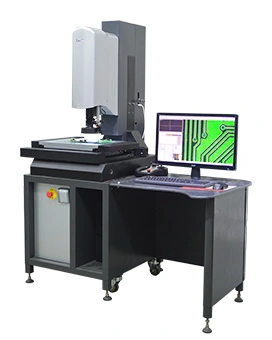How to Maximize Efficiency with a User-Friendly Video Measuring Machine
In today's manufacturing landscape, precision is not just a competitive advantage—it's a necessity. Video measuring machines (VMMs) are the go-to solution for accurate, non-contact dimensional analysis, enabling industries from automotive to electronics to achieve high-quality results. However, accuracy alone isn't enough. For a video measuring machine to truly benefit a company, it must also be easy to use and integrate seamlessly into existing workflows. In this article, we explore the key aspects of VMM ease-of-use and why these features are essential for enhancing productivity and reducing downtime.
Table of contents
Robust Software with Automation
Seamless Data Management and Export
Integration with Automation and External Systems
Learning and Support Resources
Intuitive User Interface (UI)
One of the biggest hurdles operators face when using complex machines is learning how to navigate the system. A well-designed user interface can significantly reduce the time it takes for operators to become proficient. Modern video measuring machines now feature intuitive touchscreen displays that allow operators to adjust measurement parameters, initiate scans, and review results with just a few taps. Customizable menus further enhance this ease of use, letting users save commonly used settings, streamlining repetitive tasks, and minimizing operator error.
Moreover, simplifying the interface doesn’t mean compromising functionality. Even advanced features such as 3D image analysis and automated reporting can be easily accessed and operated, making the VMM adaptable for both novice and experienced users. This usability translates into fewer errors, faster measurements, and ultimately, improved efficiency.
Robust Software with Automation
The software capabilities of a video measuring machine are just as important as its hardware. Modern VMM software is designed to automate as much of the measurement process as possible. Edge detection, for instance, is a key feature that automates the process of identifying object boundaries and measuring dimensions. The software can quickly and accurately recognize geometric features like holes, radii, and angles, drastically reducing the need for manual input.
Additionally, automated reporting tools allow users to generate detailed measurement reports immediately after scans, saving both time and effort. These reports can include everything from basic dimensions to complex geometrical tolerances, providing crucial insights that help ensure product quality. Advanced software even allows for batch processing, enabling the machine to measure multiple components at once, further increasing efficiency.
Seamless Data Management and Export
An often overlooked yet critical feature of a video measuring machine is its ability to manage and export data. Whether for quality control purposes or future reference, the machine must store and organize data efficiently. Modern VMMs are equipped with robust data management tools that allow users to store large datasets and retrieve them with ease.
More importantly, these machines can export data in a wide range of formats, including CSV, DXF, and CAD files. This flexibility ensures that the measurement data can be easily integrated into existing quality control systems or used in statistical process control (SPC) to track and improve production performance over time. The ability to export data in various formats also facilitates communication between departments, such as engineering and quality assurance, creating a more cohesive workflow.
Integration with Automation and External Systems
In modern manufacturing environments, the ability to integrate a VMM with other systems is crucial. Many video measuring machines today are designed to be compatible with third-party software, including ERP systems and manufacturing execution systems (MES). This integration streamlines the data-sharing process, ensuring that all departments have access to real-time measurement results.
Additionally, hardware integration with systems like robotic arms allows VMMs to be part of fully automated production lines. These machines can inspect components continuously, feeding data directly back to quality control systems without requiring manual intervention. This kind of integration not only improves measurement speed but also minimizes the risk of human error, ultimately leading to more consistent product quality.
Learning and Support Resources
Even the most user-friendly machine requires proper training and support. Leading manufacturers now include built-in tutorials and troubleshooting guides within the VMM software. These resources can be invaluable for operators who need to quickly learn how to use the machine or troubleshoot issues. Additionally, manufacturers often provide regular software updates that add new features or improve existing ones, ensuring that the machine remains state-of-the-art without needing costly upgrades.
Access to customer support is another important consideration. The availability of technical support, including remote diagnostics and software updates, ensures that any issues are quickly resolved, minimizing downtime.
A video measuring machine is an essential tool for ensuring precision and efficiency in manufacturing. But to truly maximize its potential, it must be easy to use, seamlessly integrate with other systems, and come with robust software and support. By focusing on these aspects, companies can ensure that their investment in a VMM translates into long-term productivity gains. To explore a range of video measuring machines designed with these user-friendly features in mind, visit Easson.

Comments
Post a Comment